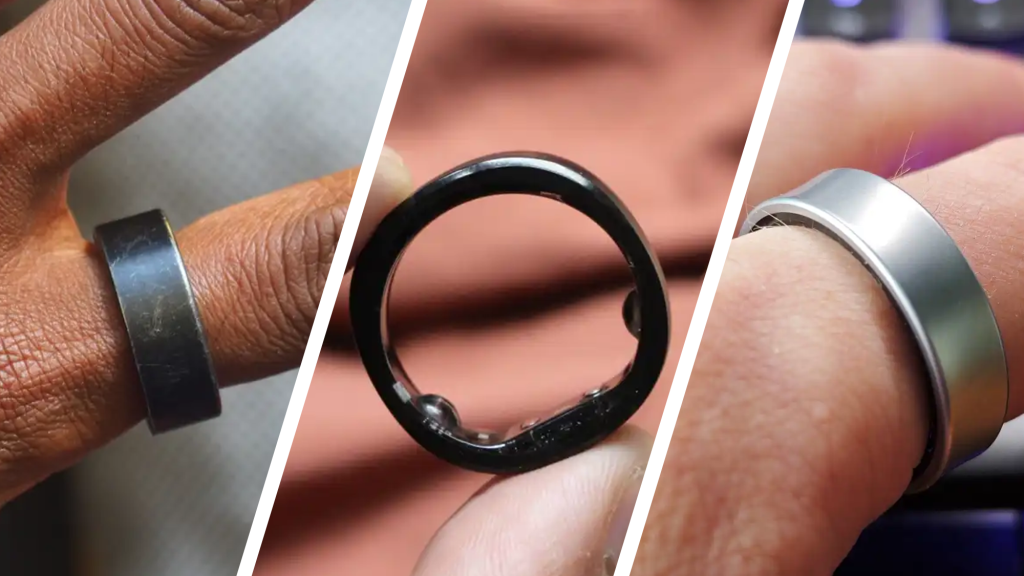I Ditched My Apple Watch for a $300 Ring. Here’s What Happened.
Three months ago, I was that person checking their smartwatch every five minutes. Notifications, heart rate, step count – my wrist had become command central for my digital anxiety. Then a friend showed me her smart ring, and I honestly thought it was just expensive jewelry.
“It tracks everything my Apple Watch does,” she said, wiggling her finger. “But I actually sleep better because I’m not staring at a screen before bed.”
I was skeptical. How could something the size of a wedding band replace my feature-packed smartwatch? But after living with a smart ring for three months, I’m never going back to a wrist-based wearable. Let me explain why these tiny devices are quietly revolutionizing how we think about health tracking.
The Moment I Realized Smart Rings Were Different
My “aha moment” came during my first week with the Oura Ring. I woke up feeling exhausted despite getting eight hours of sleep, and instead of the usual “Great job sleeping!” notification from my Apple Watch, the Oura app gently suggested I might be getting sick.
It was right. I developed a cold two days later.
The ring had detected subtle changes in my body temperature and heart rate variability that I couldn’t feel yet. That’s when I understood – this wasn’t just a smaller fitness tracker. It was like having a health-conscious friend who pays attention to details I miss.
What These Tiny Devices Actually Do (And What Surprised Me Most)
When I first started researching smart rings, I expected basic step counting and maybe heart rate monitoring. What I found was way more sophisticated.
The sleep tracking blew my mind. While my Apple Watch could tell me I slept for 7.5 hours, my Oura Ring broke down exactly how much deep sleep, REM sleep, and light sleep I got. More importantly, it started recognizing patterns. “You tend to get better deep sleep when you go to bed before 10:30 PM” became a game-changing insight.
Heart rate variability (HRV) became my new obsession. I’d never heard of this metric before, but it turns out it’s one of the best indicators of how recovered your body is. My ring taught me that even moderate alcohol consumption tanked my HRV for 2-3 days, which explained why I felt sluggish after social events.
Stress detection was eerily accurate. The ring would show elevated stress levels during work calls I thought I was handling calmly. It forced me to acknowledge stress I was unconsciously carrying.
Activity tracking without the pressure. Unlike my Apple Watch, which constantly badgered me to close rings and stand up, the smart ring just quietly collected data. I found myself naturally more active because I wasn’t being nagged about it.
The 2025 Smart Ring Landscape: What’s Actually Worth Your Money
After testing several models and talking to other users, here’s my honest take on the current options:
The Premium Choice: Oura Ring Gen 4
This is what I ended up keeping. The sleep insights are genuinely helpful, and the app presents data in a way that doesn’t make me feel like I need a medical degree to understand it. The downside? It requires a monthly subscription after the first year, which feels a bit greedy for a $300+ device.
Real-world experience: Battery lasts 5-6 days, comfortable enough that I forget I’m wearing it, and the insights actually changed my behavior rather than just giving me numbers.
The Biohacker’s Dream: Ultrahuman Ring Air
A friend who’s deep into the quantified self movement swears by this one. The metabolic tracking features are more detailed than Oura’s, and it doesn’t require a subscription. The trade-off is that the app is more complex – it’s clearly designed for people who want to dive deep into their data.
The Budget Winner: RingConn Ring
I tested this for two weeks and was impressed by how much it offered for half the price of premium options. The sleep tracking wasn’t quite as detailed as Oura’s, but it hit all the basics and the battery lasted a full week. If you’re curious about smart rings but don’t want to make a huge investment, this is a solid starting point.
The Women’s Health Focus: Evie Ring
My partner tried this one and loved the cycle tracking integration. It’s one of the few wearables designed specifically with women’s health in mind, and it shows. No subscription fee is a major plus.
The Medical Grade Option: Movano Ring
This one’s FDA-cleared for blood pressure monitoring, which is huge if you’re managing cardiovascular health. It’s pricier and bulkier than other options, but the medical accuracy is worth it for people who need it.
Smart Ring vs. Smartwatch: The Honest Comparison
After three months of switching between devices, here’s what I’ve learned:
Comfort: This isn’t even close. I sleep with my ring on without thinking about it. My Apple Watch always felt like wearing a small computer to bed (because that’s exactly what it was).
Battery anxiety: My Apple Watch needed charging every night. My ring goes 5-6 days between charges, which means I rarely think about battery levels.
Health data accuracy: The ring wins for passive metrics like sleep and heart rate. Being closer to major arteries in your finger gives it an advantage over wrist-based sensors.
Notifications: This is where smartwatches shine. My ring gives me very limited notification options, which is actually a feature, not a bug, for my digital wellness.
Fitness tracking: For active workouts, smartwatches are still better. The ring tracks overall activity well, but it can’t replace a dedicated fitness tracker for specific sports.
Social signaling: Smartwatches scream “tech person.” Smart rings fly under the radar. Most people don’t even notice I’m wearing one.
The Unexpected Benefits I Didn’t See Coming
Better sleep hygiene: Without a screen on my wrist, I naturally started charging my phone outside the bedroom and reading books before bed instead of scrolling.
Reduced notification addiction: The ring’s minimal notifications forced me to be more intentional about which alerts actually needed my immediate attention.
Long-term health awareness: Instead of focusing on daily metrics that fluctuate wildly, I started paying attention to weekly and monthly trends. This gave me a much healthier relationship with my health data.
Conversation starter: More people have asked me about my smart ring than ever asked about my Apple Watch. There’s something intriguing about health tech that doesn’t look like health tech.
Privacy: The Thing Nobody Talks About
One thing that bothered me about my Apple Watch was how much health data was tied to my Apple ID, syncing to the cloud, and potentially being used for research or advertising.
Most smart ring companies are smaller and more privacy-focused. Oura, for example, lets you opt out of cloud sync and keep all your data local. Some rings even offer end-to-end encryption for health data.
This might not matter to everyone, but knowing my sleep patterns and stress levels aren’t being analyzed by big tech companies feels good.
Who Should Actually Buy a Smart Ring in 2025?
You’re perfect for a smart ring if:
- You want health insights without constant notifications
- Sleep quality is a priority for you
- You find smartwatches bulky or distracting
- You’re interested in long-term health trends rather than daily metrics
- You already have a good grasp of your fitness routine and don’t need workout guidance
Stick with a smartwatch if:
- You love getting texts and calls on your wrist
- You do a lot of specific sports that need dedicated tracking modes
- You want to leave your phone at home during workouts
- You enjoy gamified fitness challenges and achievements
The Future is Tiny (And That’s Exciting)
The smart ring space is evolving fast. Companies are working on continuous glucose monitoring, blood pressure tracking, and even hydration detection – all in a device smaller than most wedding rings.
What excites me most is the shift toward passive, intelligent health monitoring. Instead of manually logging everything or constantly checking metrics, these devices are moving toward giving you insights when you actually need them.
I’m particularly excited about the rumored Samsung Galaxy Ring. If it integrates well with Samsung Health and offers the seamless ecosystem experience Samsung is known for, it could bring smart rings to the mainstream in a big way.
My Honest Recommendation
If you’re curious about smart rings, start with the RingConn or try to find a used Oura Gen 3. Don’t invest in the most expensive option until you know you’ll actually use the insights it provides.
The key is finding a ring that fits your lifestyle, not trying to change your lifestyle to fit the ring. I ended up loving the minimal approach, but some people really do need the full smartwatch experience.
What’s your take on wearable tech? Are you team smartwatch, considering a smart ring, or do you prefer to keep your health tracking analog? I’m always curious about how different people approach the balance between useful data and digital overwhelm.



